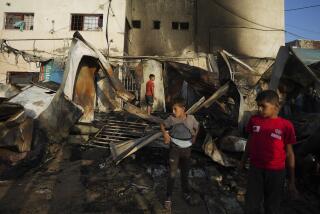Christopher Pledges More Aid to Bosnia : Balkans: Additional $150 million will double both relief flights and airdrops. Other officials say military intervention is not necessary.
- Share via
ROME — Secretary of State Warren Christopher said Tuesday that the United States will spend an additional $150 million to deliver relief supplies to beleaguered towns in Bosnia-Herzegovina this winter, although U.S. officials said there is no need for military action to break the siege.
“This winter, the snows have come early to Bosnia and the humanitarian crisis has deepened,” Christopher told foreign ministers of the 52-nation Conference on Security and Cooperation in Europe (CSCE). “In these tragic circumstances, the United States will increase its humanitarian efforts to help alleviate the suffering.”
At the same time, however, a senior member of Christopher’s official party told reporters that conditions in Sarajevo and other enclaves still held by the Muslim-led Bosnian government are less grim than they were last August, when the North Atlantic Treaty Organization threatened military action to stop Serbian militias from “strangling” Muslim-held towns.
“The situation in Sarajevo, as bad as it is, is not as bad as it was in August,” said the official, who declined to be identified. He added that Serbian shelling of the Bosnian capital and other sites “is not anywhere near what it was” at the time the NATO warning was issued.
In his speech to the opening of a two-day CSCE meeting, Christopher said the U.S. aid--which will increase by 35% the total American spending on humanitarian assistance since the Bosnian conflict began--will double both relief flights to Sarajevo and airdrops of supplies to remote areas that cannot be reached any other way.
For the next six months, he said, U.S. planes will increase flights to Sarajevo from five to 10 a day and airdrop missions from six to 12 daily. In addition, he said, Washington will increase its contributions to U.N. refugee programs and to non-government relief organizations.
“We call upon other governments and regional organizations, such as the Organization of the Islamic Conference, to increase their commitments to help the innocent people of Bosnia survive the winter,” Christopher said.
He apparently singled out the Islamic Conference, the only group cited by name, because of U.S. irritation at the organization for calling attention to the inability of the United States and its allies to end the bloodshed. The conference has demanded the use of force by the international community to ease the plight of Bosnian Muslims.
Talking to reporters earlier in the day, Christopher said economic sanctions “are our only real leverage at the present time over Serbia,” a statement that clearly ruled out the use of force.
Christopher welcomed the agreement by Bosnia’s three warring communities to resume peace talks, but he cautioned against lifting any of the sanctions until a peace agreement is signed and appears to be holding.
Christopher attended only the first day of the CSCE session, skipping today’s session to travel to Brussels for trade talks with officials of the European Community.
In contrast to the emphasis that President Clinton and Christopher placed on U.S. relations with Asia and the Pacific last month, Christopher assured the CSCE ministers that Washington still considers its relationship with Europe the core of its foreign policy.
Christopher’s talks with European Community officials are intended to break an impasse in the long-running negotiations intended to lower tariffs and other trade barriers around the world. Congressional authorization for U.S. participation in the talks expires Dec. 15, and the Administration is unwilling to request an extension.
More to Read
Sign up for Essential California
The most important California stories and recommendations in your inbox every morning.
You may occasionally receive promotional content from the Los Angeles Times.












